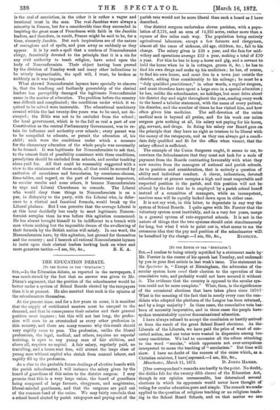THE EDUCATION DEBATE.
[TO THE EDITOR OF THE "SPECTATOR."]
SIB,—In the Education debate, as reported in the newspapers, I was much struck by the fact that no answer was given to Mr. Dixon's argument, that the position of the schoolmaster would be better under a system of School Boards elected by the ratepayers than it is at present. He also asserted that such is the opinion of the schoolmasters themselves.
At the present time. and for a few years to come, it is manifest that the supply of certificated masters must be unequal to the demand, and that in consequence their salaries and their general position must improve ; but this will not last long, the profes- sion will soon be as overstocked as every other profession in this country, and there are many reasons why this result should very rapidly come to pass. The profession, unlike the liberal professions, the legal, medical, and others, requires no especial training, is open to any young man of fair abilities, and above all, requires no capital. A fair salary, regularly paid, no travelling, and a house rent free, will attract the large class of young men without capital who shrink from manual labour, and rapidly fill up the profession.
As a clue to the probable future dealings of elective boards with the parish schoolmaster, I will instance the salary given by the board of guardians of this union to the district surgeon. I may premise that this is a very large union, the board of guardians being composed of large farmers, clergymen, and magistrates, liberal-minded gentlemen, and that the surgeons are paid out • of the common fund of the union. We may fairly conclude that a school board elected by parish ratepayers and paying out of the pariah rate would not be more liberal than such a board as I have• described.
Our district surgeon undertakes eleven parishes, with a popu- lation of 2,721, and an area of 14,225 acres, rather more than a square of five miles each way. The population being entirely agricultural labourers, except a few farmers and clergymen, almost all the cases of sickness, old age, children, &c., fall to his charge. The salary given is £38 a year, and the fees for mid- wifery and operations average £32 a year, making a total of £70' a year. For this he has to keep a horse and gig, and a servant to hold the horse when he is in cottages, groom it, &c. ; he has to. find his own drugs and make up his medicines ; he has, of course, to find his own house, and must live in a town just outside the district, adding thus considerably to his mileage ; he must be a "duly qualified practitioner," in other words, a regular 5hrgeon, and must therefore have spent a large sum in a special education ; he has, unlike the schoolmaster, no holidays, but must drive about his district day and night throughout the year, sending every week to the board a tabular statement, with the name of every patient,. his disorder, and the number of times he has visited him, and how often given him medicine. The self-devotion of the union. medical men is beyond all praise, and for his work our union• surgeon gets nothing at all, his salary not paying for his horse, gig, servant, and drugs. In fixing his salary our Board goes mm the principle that they have no right as trustees to be liberal witla the money of the ratepayers, and as they can always get a candi- date duly qualified and fit for the office when vacant, that the salary offered is sufficient.
The example of the Union Surgeons ought, it seems to me, to convince the Schoolmasters that they must not look for a scale of payment from the Boards contrasting favourably with what they now receive from the managers of national and parish schools.. As to position and consideration, that is entirely a question of ability and individual conduct. A clever, industrious, devote& schoolmaster at present occupies a high and most respectable and respected position in the parish, and this position will not be• altered by the fact that he is employed by a parish school boardt instead of a committee of managers, while an incompetent,. careless man will be equally looked down upon in either case.
It is not my wish, in this letter, to depreciate in any way the system of School Boards. I quite agree with Mr. Forster that the voluntary system must inevitably, and in a very few years, merge in a general system of rate-supported schools. It is not in the nature of things that the two systems should exist simultaneously for long, but what I wish to point out is, what seems to me the- erroneous idea that the pay and position of the schoolmaster wilh be benefited by the change.—I am, Sir, &c., Rvoicus.-


































 Previous page
Previous page